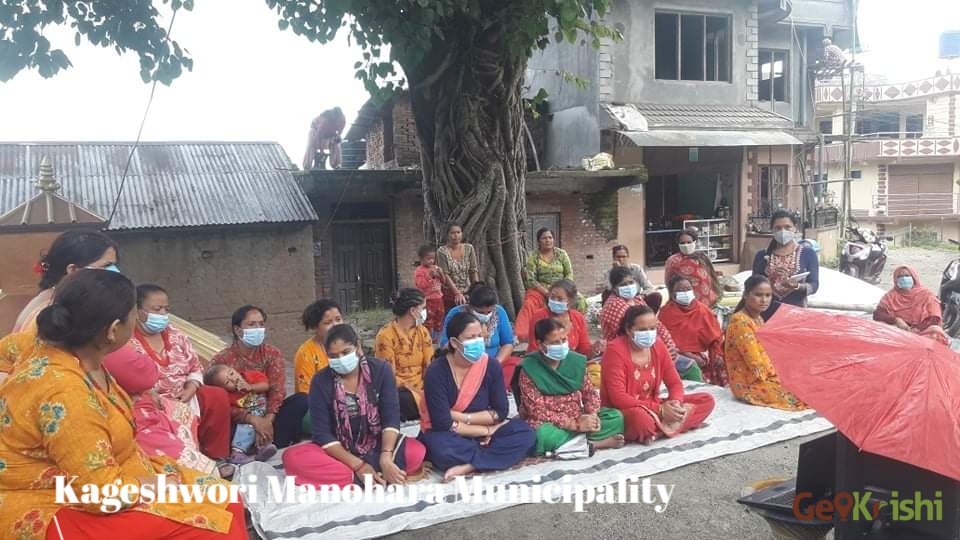e-Chautari Meet-Up for the Rice disease and pest: with their management practices
भाद्र १७, २०७८ | Prakash Sejwal

Rice is one of the most important cereal crops and one of the major staple food crops in Nepal. Not only is rice a key source of carbohydrate and essential nutrients, but also a major source of employment for those who are involved in the agro sector. Nepal's economic growth depends upon rice production as rice has more than 50% share of total food production. As per the Fiscal Year 2020/2021, rice was grown in 1.47 a million hectares of land with the production of 5.621 million metric tons with a productivity was 3.81 tons/ha. These low yields in rice can be attributed to a gap that exists between what farmers are harvesting in their rice fields and what has been demonstrated by research.
Farmers lose an estimated average of 37% of their rice crop to pests
and diseases every year. Lack of access to timely advisory service on disease
identification and access to basic inputs together with post-harvest loss
credits for much of the annual dividend on what could be provided versus what
the market received. In addition to good crop management, timely and accurate
diagnosis can significantly reduce losses (http://www.knowledgebank.irri.org).
GeoKrishi is a digital agri-advisory service
platform that assists farmers to access the right information at the right time through
multiple channels in the most understandable manner. Out of its many approaches
to connect with farmers, GeoKrishi also operates through a social media network
through a Facebook group called 'GeoKrishi e-Chautari'. Recently there have
been growing concerns regarding a rice disorder (disease and pest) in our
e-chautari (GeoKrishi) platforms by rice growers’ farmers. Hence, in order to
establish a tailored information supply and respond to a large audience, a
digital webinar was organized.
GeoKrishi with the help of CEAPRED organized a
webinar series entitled 'e-Chautari Meet' (ई चौतारी भेटघाट) for the
Rice disease and pest: with their management practices. Mr. Kiran Bhusal
(Programme Coordinator, RMS, CEAPRED) joined our hand as the facilitator and
expert for the webinar where more than 120 rice-growing farmers accompanied our the online webinar which comprised of 6 farmers groups and cooperative members from
the distinct parts of Nepal like Kathmandu, Dang, Rupandehi, Kanchanpur, Gulmi,
Salyan, Banke, Bardiya, Morang, Dhanusa, Kavre, Kailali, etc.
The webinar on rice disease and pest management
was conducted on 4 Bhadra, 2078 B.S. which started with an introductory
presentation of GeoKrishi followed by the detailed information of all the
corresponding rice diseases and pests. The Expert session was more focused on
Integrated Pest Management (IPM) methods of disease and pest control with their
illustration and pictures. The facilitator focused on enabling farmers to
identify the disease and take immediate action to stop further infestation.
Furthermore, the floor was open for the farmers to put their queries and ask
questions. The expert acknowledged all the farmers' queries respectively.
Later the session was closed with the closing remarks by the GeoKrishi team and
group photo sessions.
Some of our key
learning from the webinar is that the best control for pests and disease
problems are prevented. To limit pest
and disease damage:
§ Practice
good cleaning of equipment and field between seasons
§ Use clean
seeds and resistant varieties
§ Do not
over apply fertilizer
§ Encourage
natural pest enemies
§ Do not
apply pesticide within 40 days of planting
As it is well evident that, most Nepalese farmers are concentrated in
rural areas where internet access is insubstantial. In such situations due to
the lack of adequate infrastructures to connect to digital information hubs will
prohibit farmers to participate and gain the right subject matter knowledge. The
concept of e-chautari tackles such limitations and brought such farmers
together to connect them with the digital agriculture advisory services. An
e-chautari refers to any open space with a minimum criterion of internet access
and a connecting device. Farmers can get
the information of market, price, inputs, weather, value addition, production
practices, and good agriculture practices (GAP) from e-chautari and also
participate in webinars conducted above.
Farmer-centric webinars are very important as they provide a safe
space for farmers to learn and share their issues. Also as 'e-Chautari Meet'
chooses topics based on requirements of the farmers themselves, it provides an
opportunity to interact with subject matter experts of the contemporary topics.
Such kinds of the webinar will be organized within the fortnight interval in
farmers and partners organizations demand.